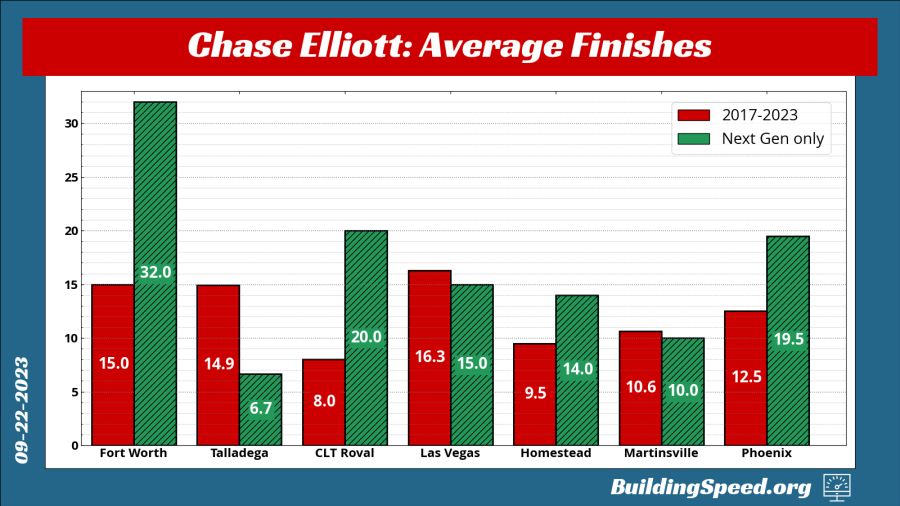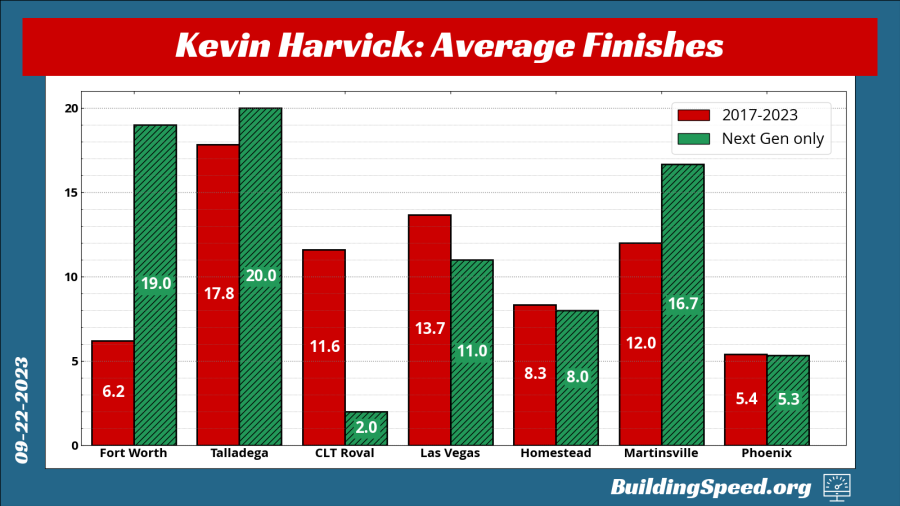Dr. Diandra: Can Chase Elliott and Kevin Harvick win before season ends?
Playoff standings reset before Rd. of 12 at Texas
Dustin Long previews the first Round of 12 NASCAR Cup Series playoff race at Texas Motor Speedway, where the points have been reset, and William Byron and Martin Truex Jr. find themselves at the top of the standings.
For non-playoff drivers — and drivers eliminated from the playoffs — winning one (or more) of the remaining seven races is the best way they can close the season. That’s especially true for Chase Elliott, who failed to make the playoffs, and Kevin Harvick, who was eliminated last week from his final Cup Series playoff bid.
The remaining tracks offer something for every driver — three intermediates (Texas, Las Vegas and Homestead), one short and one very short track (Phoenix and Martinsville), a superspeedway and a road course.
Last year, three drivers earned their first wins of the season during the playoffs. Two more drivers won after they’d been eliminated from the playoffs. That would seem to suggest Elliott — whose car is still in the owners playoff — and Harvick have pretty good odds of winning before the year is out.
Do they?
History with context
Since the current playoff format started in 2014, there have been nine complete seasons and 90 playoff races. Thirteen of those races — just 14% — were won by drivers not in the playoffs at the time they won.
Of those 13 races, only five were won by drivers who failed to make the playoffs. The other eight races were won by drivers who had made the playoffs but had been eliminated by the time they won.
For six of the 15 drivers, their playoff race win was their first of the year.
That would seem to leave Elliott with a 5.5% chance of winning a playoff race and Harvick an 8.9% chance. But there’s a caveat in those numbers.
Five of the 15 non-playoff drivers won their races in 2022. Erik Jones, Bubba Wallace and Chris Buescher scored their first wins of the season during the playoffs. Tyler Reddick and Kyle Larson won races after they’d been eliminated from the drivers title.
In retrospect, the 2022 season is starting to look more like an anomaly than the start of a trend. The 19 winners may be more attributable to some teams struggling with the Next Gen car than to the inherent properties of the car.
Before 2022, non-playoff drivers won no more than two playoff races in a year. In 2016, 2018 and 2019, playoff drivers won all 10 races.
Chase Elliott’s chances
If Elliott hadn’t missed races (and assuming he scored as well as he’s done on average in the races he did run), he would have made the playoffs on points. Elliott’s 12.4 average finish over 22 races is the third highest among full-time Cup Series drivers.
To put that number in perspective: Elliott's average finish is one-tenth of a position better than playoff co-leader William Byron.
Excluding three DNFs, Elliott’s had only one bad race this year: He finished 32nd at Watkins Glen after running out of fuel. His other finishes were all in the top 15, with 13 out of 22 top-10 finishes (59.1%) and 7 of 22 (31.8%) top fives. Elliott has the best top-10 rate among full-time drivers and the fourth-best top-five rate.
But he hasn’t won. Yet.
Elliott can’t blame his lack of wins this year entirely on missing races. After dominating the 2022 regular season, Elliott faded during the playoffs. This 27-race winless streak (since October’s Talladega race) is the longest of his career. The second-longest streak was 26 races between winning Road America in 2021 and winning Dover in 2022.
The graph below shows Elliott’s average finishes for the stage-racing era (2017-2023) and in the Next Gen car. Texas, the Charlotte Roval and Homestead have only hosted one Next Gen race and the Texas data suffers from a large number of accidents due to blown tires.

Elliott has won at four of the seven tracks: Talladega, the Roval, Martinsville and Phoenix. His best finish at Las Vegas and Homestead is second place. Texas is the odd track for Elliott with a best finish of sixth.
Elliott’s best chance at winning appears to be at Talladega, where he has a 6.7 average finish over three Next Gen races. That’s a good average for any track, but an excellent average for a superspeedway. Balance that, however, with a 23.1% career DNF rate at the track and a handful of desperate playoff drivers for whom winning Talladega might be the only chance to stay in the playoffs.
Elliott could also win a checkered flag at Martinsville, where Hendrick Motorsports has long found success.
Kevin Harvick’s last hurrahs
Harvick, winless in his last season of Cup Series competition, has acknowledged the pressure he feels from fans wanting him to win at least once more before he retires. The same caveats apply to the graph below as they did to Elliott’s.

Changing cars hasn’t changed Harvick’s ability to dominate at Phoenix. He hasn’t finished worse than sixth in the Next Gen car. But the season champion has won the final race since this playoff format started.
Although Fords have struggled with speed this year, Harvick is one of the few Ford drivers who has been able to outperform his car. Keep an eye on Harvick at the intermediate tracks. He finished ninth at Las Vegas this spring, and 11th at both Kansas races and at Charlotte.
Harvick and Elliott can both win this year, but they’ll need everything to go their way.

